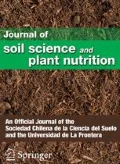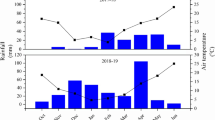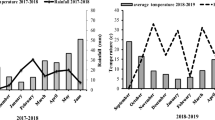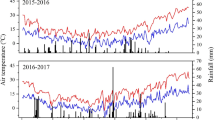Abstract
To determine the suitable sowing date in each region, it is important to note that environmental conditions should be optimal during the crop growing season. Plant nutrition using macro-elements and micro-elements improves crop growth and quantitative and qualitative yields under environmental stresses. A 2-year experiment (2015–2016 and 2016–2017) was conducted to investigate the effect of zinc (Zn) foliar spray on quantitative and qualitative yields of spring rapeseed genotypes at winter sowing dates. The factorial split-plot arrangement of treatments was set up in a randomized complete block design with three replications. Main plots included three winter sowing dates of 9, 19, and 29 February and Zn foliar spray at two levels of non-Zn foliar spray (control) and Zn foliar spray (5 g l−1 at the stem elongation stage). Sub-plots contained four genotypes of Sarigol, Dalgan, Salsa, and Solar. While silique number per plant, seed number per silique, 1000-seed weight, seed yield, oil yield and content, and oleic, linoleic, and palmitic acids of the study genotypes were lessened at late sowing dates, contents of linolenic, stearic, and erucic acids and glucosinolate were significantly increased in such condition. Zn foliar spray improved seed yield and yield components, oil yield and content, and linoleic acid content, while contents of linolenic, stearic, and erucic acids and glucosinolate were dropped. Overall, the current study suggests that to produce the optimal quantitative and qualitative yields in rapeseed agro-ecosystems, genotypes should be cultivated on an optimum winter sowing date (February 9) and treated with Zn.


Similar content being viewed by others
References
[FAO] Food and Agriculture Organization of the United Nations 2019. FAOSTAT data. www.faostat.fao.org
Alloway BJ (2008) Zinc in soils and crop nutrition, Second edn. IZA and IFA Publication, Brussels, Belgium and Paris, France
Amiri SR, Deihimfard R, Eyni-Nargeseh H (2020) Toward dormant seeding of rainfed chickpea as an adaptation strategy to sustain productivity in response to changing climate. Field Crops Res 247:107674. https://doi.org/10.1016/j.fcr.2019.107674
Amiri-Darban N, Nourmohammadi G, Shirani Rad AH, Mirhadi SMJ, Majidi Heravan I (2020) Potassium sulfate and ammonium sulfate affect quality and quantity of camelina oil grown with different irrigation regimes. Ind Crop Prod 148:112308. https://doi.org/10.1016/j.indcrop.2020.112308
Azadmard-Damirchi S, Dutta PC (2006) Novel solid-phase extraction method to separate 4 desmethyl-, 4-monomethyl-, and 4, 40-dimethylsterols in vegetable oils. J Chromatogr 1108:183–187. https://doi.org/10.1016/j.chroma.2006.01.015
Azadmard-Damirchi S, Savage GP, Dutta PC (2005) Sterol fractions in hazelnut and virgin olive oils and 4,4′-dimethylsterols as possible markers for detection of adulteration of virgin olive oil. J Am Oil Chem Soc 82:717–725. https://doi.org/10.1007/s11746-005-1133-y
Beheshti Monfared B, Noormohamadi G, Shirani Rad AH, Majidi Heravan E (2020) Effects of sowing date and chitosan on some characters of canola (Brassica napus L.) genotypes. J Crop Sci Biotech 23:65–71. https://doi.org/10.1007/s12892-019-0177-0
Beyzi E, Gunes A, Beyzi SB, Konca Y (2019) Changes in fatty acid and mineral composition of rapeseed (Brassica napus spp. oleifera L.) oil with seed sizes. Ind Crop Prod 129:10–14. https://doi.org/10.1016/j.indcrop.2018.11.064
Brennan RF (2001) Residual value of zinc fertilizer for production of wheat. Aust J Exp Agric 41:541–547. https://doi.org/10.1071/EA00139
Bybordi A, Mammadov G (2010) Evaluation of application methods efficiency of zinc and iron for canola (Brassica napus L.). Not Sci Biol 2:94–103. https://doi.org/10.15835/nsb213531
Diepenbrock W (2000) Yield analysis of winter oilseed rape: a review. Field Crops Res 67:35–49. https://doi.org/10.1016/S0378-4290(00)00082-4
Eyni-Nargeseh H, Aghaalikhani M, Shirani Rad AH, Mokhtassi-Bidgoli A, Modares Sanavy SAM (2020a) Comparison of 17 rapeseed cultivars under terminal water deficit conditions using drought tolerance indices. J Agr Sci Tech 22:489–503
Eyni-Nargeseh H, Aghaalikhani M, Shirani Rad AH, Mokhtassi-Bidgoli A, Modares Sanavy SAM (2020b) Late season deficit irrigation for water-saving: selection of rapeseed (Brassica napus) genotypes based on quantitative and qualitative features. Arch Agron Soil Sci 66:126–137. https://doi.org/10.1080/03650340.2019.1602866
Fang Y, Wang L, Xin Z, Zhao L, An X, Hu Q (2008) Effect of foliar application of zinc, selenium, and iron fertilizers on nutrients concentration and yield of rice grain in China. J Agric Food Chem 56:2079–2084
Faraji A, Lattifi N, Soltani A, Shirani-rad AH (2009) Seed yield and water use efficiency of canola. (Brassica napus L.) as affected by high temperature stress and supplemental irrigation. Agric. Water Manag 96:132–140. https://doi.org/10.1016/j.agwat.2008.07.014
Fathi-Achachlouei F, Azadmard-Damirchi S (2009) Milk thistle seed oil constituents from different varieties grown in Iran. J Am Oil Chem Soc 86:643–649. https://doi.org/10.1007/s11746-009-1399-y
Feizabadi A, Noormohammadi GH, Fatehi F (2020) Changes in growth, physiology, and fatty acid profile of rapeseed cultivars treated with vermicompost under drought stress. J Soil Sci Plant Nutr. https://doi.org/10.1007/s42729-020-00353-4
Fieldsend JK, Murray FE, Bilsborrow PE, Milford GFL, Evans EJ (1991) Glucosinolate accumulation during seed development in winter sown oilseed rape (B. napus). In: McGregor DI (ed) Proceedings of 8th international rapeseed congress. Canada Saskatoon, Flanigen, pp 686–694
Gharechaei N, Paknejad F, Shirani Rad AH, Tohidloo G, Jabbari H (2019) Change in oil fatty acids composition of winter oilseed rape genotypes under drought stress and different temperature regimes. Plant Soil Environ 65:503–507. https://doi.org/10.17221/519/2019-PSE
Harinder P, Makkar S, Siddhuraju P, Becker K (2007) Plant secondary metabolites. Humana Press, pp 58–60
Ibrahim EA, Ramadan WA (2015) Effect of zinc foliar spray alone and combined with humic acid or/and chitosan on growth, nutrient elements content and yield of dry bean (Phaseolus vulgaris L.) plants sown at different dates. Sci Horti 184:101–105. https://doi.org/10.1016/j.scienta.2014.11.010
ISO 5511 (1992) Oilseeds — determination of oil content — method using continuous-wave low-resolution nuclear magnetic resonance spectrometry (rapid method)
Khan HR, McDonald GK, Rengel Z (2003) Zn fertilization improves water use efficiency, grain yield and seed Zn content in chickpea. Plant Soil 241:389–400. https://doi.org/10.1023/A:1022808323744
Khayat M, Rahnama A, Lorzadeh S, Lack S (2016) Physiological indices, phenological characteristics and trait evaluation of canola genotypes response to different planting dates. Proc. Natl. Acad. Sci., India, Sect. B Biol. Sci 88:153–163. https://doi.org/10.1007/s40011-016-0733-z
Kirland KG, Johnson EN (2000) Alternative seeding dates (fall and April) affect canola (Brassica napus) yield and quality. Can J Plant Sci 80:715–719
Lancashire PD, Blieholder H, Langeluddecke P, Stauss R, Van den boom T, Weber E, Witzen-Berger A (1991) An uniform decimal code for growth stages of crops and weeds. Ann Appl Biol 119:561–601
Liakas V, Malinauskas D, Diuliauskas A (2005) Impact of the additional leaf spray fertilization of rape on the yield and its structural elements. Lat J Agron 8:112–117
Moinuddin P, Imas P (2008) Effect of zinc nutrition on growth, yield, and quality of forage sorghum in respect with increasing potassium application rates. J Plant Nutr 33:2062–2081. https://doi.org/10.1080/01904167.2010.519081
Mokhtassi-Bidgoli A, AghaAlikhani M, Nassiri-Mahallati M, Zand E, Gonzalez-Andujar JL, Azari A (2013) Agronomic performance, seed quality and nitrogen uptake of Descurainia sophia in response to different nitrogen rates and water regimes. Ind. Crops Prod 44:583–592. https://doi.org/10.1016/j.indcrop.2012.09.018
Moradi Aghdam A, Sayfzadeh S, Shirani Rad AH, Valadabadi SA, Zakerin HR (2019) The assessment of water stress and delay cropping on quantitative and qualitative traits of rapeseed genotypes. Ind Crop Prod 131:160–165. https://doi.org/10.1016/j.indcrop.2019.01.051
Movahhedy-Dehnavy M, Modarres-Sanavy SAM, Mokhtassi-Bidgoli A (2009) Foliar application of zinc and manganese improves seed yield and quality of safflower (Carthamus tinctorius L.) grown under water deficit stress. Ind. Crops. Prod 30:82–92. https://doi.org/10.1016/j.indcrop.2009.02.004
Nazeri P, Shirani Rad AH, ValadAbadi SA, Mirakhori M, Hadidi Masoule E (2018) Effect of sowing dates and late season water deficit stress on quantitative and qualitative traits of canola cultivars. Outlook Agr 47:291–297. https://doi.org/10.1177/0030727018793658
Noulas C, Tziouvalekas M, Karyotis T (2018) Zinc in soils, water and food crops. J Trace Elem Med Biol 49:252–260. https://doi.org/10.1016/j.jtemb.2018.02.009
Omidi H, Tahmasebi Z, Naghdi Badi HA, Torabi H, Miransari M (2010) Fatty acid composition of canola (Brassica napus L.), as affected by agronomical, genotypic and environmental parameters. C R Biol 333:248–254. https://doi.org/10.1016/j.crvi.2009.10.001
Pavlista AD, Isbell TA, Baltensperger DD, Hergert GW (2011) Planting date and development of spring-seeded irrigated canola, brown mustard and camelina. Ind Crop Prod 33:451–456. https://doi.org/10.1016/j.indcrop.2010.10.029
Rahimi-Moghaddam S, Eyni-Nargeseh H, Kalantar Ahmadi SA, Azizi K (2020) Towards withholding irrigation regimes and resistant genotypes as strategies to increase canola production in drought-prone environments: a modeling approach. Agric Water Manag 243:106487. https://doi.org/10.1016/j.agwat.2020.106487
Rahimi-Moghaddam S, Kambouzia J, Deihimfard R (2019) Optimal genotype × environment × management as a strategy to increase seed maize productivity and water use efficiency in water-limited environments and rising temperature. Ecol Indic 107:105570. https://doi.org/10.1016/j.ecolind.2019.105570
Safavi Fard N, Heidari Sharif Abad H, Shirani Rad AH, Majidi Heravan E, Daneshian J (2018) Effect of drought stress on qualitative characteristics of canola cultivars in winter cultivation. Ind Crop Prod 114:87–92. https://doi.org/10.1016/j.indcrop.2018.01.082
Safdari-Monfared N, Noor-Mohammadi G, Shirani-Rad AH, Heravan E (2019) Effect of sowing date and glycinbetaine on seed yield, oil content, and fatty acids in rapeseed cultivars. J. Agr. Sci. Tech 21:1495–1506
Savage GP, Mcneil DL, Dutta PC (1997) Lipid composition and oxidative stability of oils in hazelnuts (Corylus avellana L.) grown in New Zealand. J Am Oil Chem Soc 74:755–759. https://doi.org/10.1007/s11746-997-0214-x
Shahsavari N (2019) Effects of zeolite and zinc on quality of canola (Brassica napus L.) under late season drought stress. Commun Soil Sci Plant Anal 50:1117–1122. https://doi.org/10.1080/00103624.2019.1604729
Sharghi Y, Shirani-Rad AH, Ayeneh-Band A, Noormohammadi G, Zahedi H (2011) Yield and yield components of six canola (Brassica napus L.) cultivars affected by planting date and water deficit stress. Afr J Biotechnol 10:9309–9313. https://doi.org/10.5897/AJB11.048
Shirani Rad AM (2012) The study of agronomical traits of spring rapeseed cultivars in condition of different plantings dates (Karaj region in Iran). Annal Biol Res 3:4546–4550
Shoja T, Majidian M, Rabiee M (2018) Effects of zinc, boron and sulfur on grain yield, activity of some antioxidant enzymes and fatty acid composition of rapeseed (Brassica napus L.). Acta Agric Slov 111:73–84 https://doi.org/10.14720/aas.2018.111.1.08
Sipalova M, Losak T, Hlusek J, Vollmann J, Hudec J, Filipcik R, Macek M, Kracmar S (2011) Fatty acid composition of Camelina sativa as affected by combined nitrogen and Sulphur fertilization. Afr J Agric Res 6:3919–3923. https://doi.org/10.5897/AJAR11.646
Wang N, Duan JK (2006) Effects of variety and crude protein content on nutrients and anti-nutrients in lentil. Food Chem 95:493–502. https://doi.org/10.1016/j.foodchem.2005.02.001
Zaman Fashami M, Dadashi MR, Shirani Rad AH, Khorgami A (2018) Analysis of the effect of plant density and use of selenium on oil quality and quantity in winter-planted canola varieties. Appl Ecol Environ Res 16:6903–6916. https://doi.org/10.15666/aeer/1605_69036916
Acknowledgements
The authors gratefully acknowledge the support provided for this survey by the Seed and Plant Improvement Institute (SPII), Karaj, Iran. The authors are thankful to the Editor-in-Chief and reviewers for their constructive suggestions and comments.
Author information
Authors and Affiliations
Contributions
Amir Hosein Shirani Rad: Conceptualization, methodology, and writing (original draft preparation); Farnaz Ganj-Abadi: Project administration and field practices; Ehsan Ollah Jalili: Investigation and field practices; Hamed Eyni-Nargeseh: Software, methodology, formal analysis, and writing (original draft preparation); Nadia Safavi Fard: Software.
Corresponding author
Ethics declarations
Competing Interests
The authors declare no competing interests.
Additional information
Publisher’s note
Springer Nature remains neutral with regard to jurisdictional claims in published maps and institutional affiliations.
Rights and permissions
About this article
Cite this article
Rad, A.H.S., Ganj-Abadi, F., Jalili, E.O. et al. Zn Foliar Spray as a Management Strategy Boosts Oil Qualitative and Quantitative Traits of Spring Rapeseed Genotypes at Winter Sowing Dates. J Soil Sci Plant Nutr 21, 1610–1620 (2021). https://doi.org/10.1007/s42729-021-00465-5
Received:
Accepted:
Published:
Issue Date:
DOI: https://doi.org/10.1007/s42729-021-00465-5




